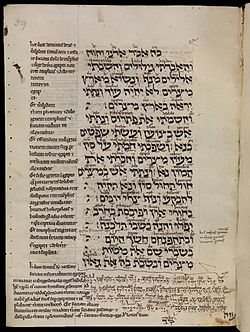| Ezekiel 9 | |
|---|---|
 Book of Ezekiel 30:13–18 in an English manuscript from the early 13th century, MS. Bodl. Or. 62, fol. 59a. A Latin translation appears in the margins with further interlineations above the Hebrew. | |
| Book | Book of Ezekiel |
| Hebrew Bible part | Nevi'im |
| Order in the Hebrew part | 7 |
| Category | Latter Prophets |
| Christian Bible part | Old Testament |
| Order in the Christian part | 26 |
Ezekiel 9 is the ninth chapter of the Book of Ezekiel in the Hebrew Bible or the Old Testament of the Christian Bible. This book contains the prophecies attributed to the prophet/priest Ezekiel, and is one of the Books of the Prophets. [1] This chapter, sub-titled "The Wicked Are Slain" in the New King James Version, [2] contains God's "judgment on the idolaters" [3] who defiled the temple in Jerusalem. Ezekiel's vision of the defiled temple continues as far as Ezekiel 11:25. [4]


